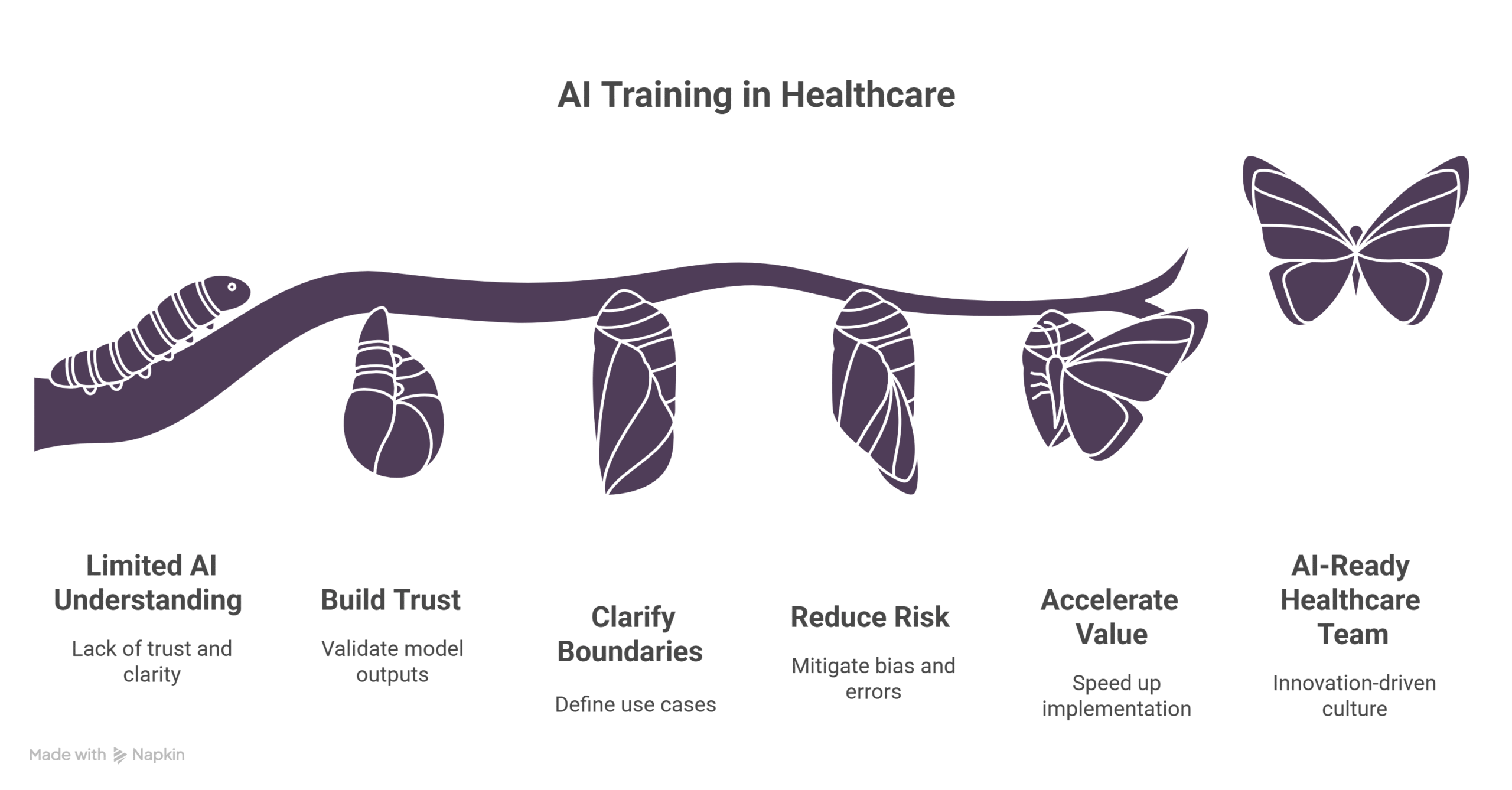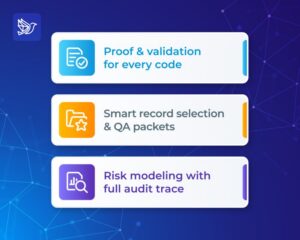AI adoption in healthcare depends not only on robust technology but also on informed teams. Despite advancements in generative AI and large language models (LLMs), many organizations still face resistance or underutilization due to training gaps. So, how do you equip healthcare professionals to confidently integrate AI into their workflows?
Why Is AI Training Essential in Healthcare?
Training ensures safe, ethical, and effective use of AI across clinical and operational settings. Without it, even the most accurate model or streamlined workflow may be met with mistrust or misapplication.
Effective AI training:
- Builds trust in model outputs
- Clarifies model boundaries and use cases
- Reduces risk of bias or misinterpretation
- Accelerates time to value
- Fosters a culture of innovation
When clinicians and administrators understand the “why” and “how” behind AI solutions, adoption follows naturally.
What Are the Biggest Barriers to AI Adoption by Healthcare Teams?
Common challenges include:
- Lack of digital literacy: Many clinicians have limited exposure to advanced AI systems.
- Fear of job displacement: Some staff worry that automation may replace, rather than augment, their roles.
- Opaque algorithms: Black-box models create hesitation, particularly when patient care is at stake.
- Regulatory complexity: Teams may be unsure how AI tools comply with HIPAA, GDPR, and FDA guidelines.
Addressing these barriers requires targeted training programs that are clear, empathetic, and backed by real-world use cases.
What Makes AI Training Effective for Healthcare Professionals?
Healthcare professionals benefit most from training that is:
- Role-specific: Tailored for nurses, medical doctors, specific specialties, medical coders, administrators, etc.
- Hands-on: Built around real patient data, de-identified when necessary
- Contextualized: Demonstrates how AI integrates into EHRs, billing systems, or risk adjustment workflows
- Regulatory-aware: Emphasizes HIPAA, HITRUST, and explainability requirements
- Outcome-focused: Links AI use to measurable improvements in outcomes, compliance, or efficiency
John Snow Labs, for example, offers LLM-powered tools that allow users to explore different healthcare applications, from support to clinical decision to revenue cycle automation, all within a safe, compliant environment accompanied always by learning resources that can be adapted to specific audiences.
How Can Organizations Encourage AI Learning Across Teams?
Driving engagement across departments requires:
- Leadership buy-in: Executives and clinical leaders must actively participate in training
- Learning pathways: Offer beginner to advanced levels across departments
- Microlearning modules: Short, scenario-based lessons that fit into busy schedules
- Certification programs: Provide tangible recognition of AI fluency
- Ongoing support: Maintain access to mentors, documentation, and a feedback loop for questions
Healthcare is dynamic, training should be, too. AI literacy must evolve with the models and regulations it depends on.
What AI Training Opportunities Are Available for Healthcare Teams?
At John Snow Labs, we offer hands-on AI training that combines real-world clinical applications with leading NLP and LLM technologies. Our approach prioritizes ease of adoption, regulatory readiness, and team-wide engagement. There are constantly new live online training sessions available to help your team.
👉 Explore John Snow Labs AI Training Courses
Whether you’re a data scientist, clinical informaticist, or healthcare administrator, there’s a course designed for your needs.
FAQs
What is the best way to start training healthcare teams on AI?
Begin with foundational courses that explain key AI concepts, regulatory compliance, and practical use cases. Gradually layer in technical training tailored to each role.
Are these AI trainings only for technical professionals?
No. Our trainings are designed for diverse roles including clinicians, quality officers, and IT staff. We offer both technical and non-technical tracks.
How long do the training programs take?
Courses range from half-day workshops to multi-week certifications. Our October sessions include flexible formats to fit various schedules.
Can teams get certified?
Yes. Completion of training modules includes a certificate that can be used for internal upskilling programs and professional development.
Supplementary Q&A
How does AI training improve patient outcomes?
By reducing documentation errors, accelerating diagnosis, and enhancing compliance, trained staff can use AI to directly improve care quality and patient safety.
Can AI training help with regulatory compliance?
Absolutely. Training often includes best practices for HIPAA, GDPR, and HITRUST, helping teams deploy AI responsibly and with confidence.






























